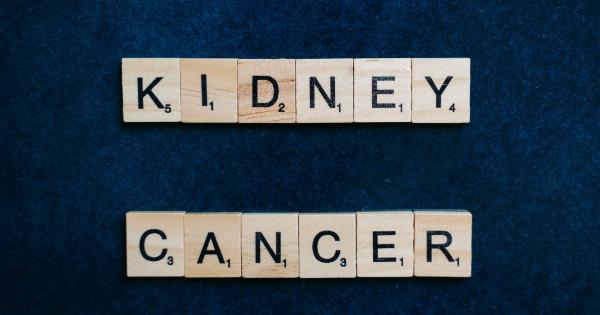Kidney cancer, also known as renal cell carcinoma, is a type of cancer that originates in the kidneys. It occurs when the cells in the kidney start to grow uncontrollably, forming a tumor.
While the exact cause of kidney cancer is unknown, there are several factors that can increase a person’s chances of developing this disease. Understanding these risk factors is crucial for early detection, prevention, and effective treatment.
1. Tobacco Use
Smoking cigarettes or using other tobacco products significantly increases the risk of kidney cancer. The harmful chemicals present in tobacco smoke can enter the bloodstream, affecting the kidneys and increasing the likelihood of cancer development.
Quitting smoking or avoiding tobacco use altogether can greatly reduce the risk of kidney cancer.
2. Obesity
Carrying excess body weight, especially in the abdominal area, can elevate the risk of kidney cancer.
Obesity not only causes hormonal changes in the body but also leads to chronic inflammation and insulin resistance, all of which can contribute to the development of cancerous tumors. Maintaining a healthy weight through regular exercise and a balanced diet can lower the risk.
3. High Blood Pressure
Individuals with high blood pressure, also known as hypertension, have an increased risk of kidney cancer. The constant high pressure on the blood vessels in the kidneys can damage the cells and increase the chances of cancerous growth.
Regular blood pressure check-ups and proper management of hypertension can help reduce the risk of kidney cancer.
4. Family History
A family history of kidney cancer can significantly increase an individual’s chances of developing the disease. If close relatives, such as parents or siblings, have had kidney cancer, the risk is higher.
This suggests that genetic factors may play a role in the development of kidney cancer. Genetic counseling and regular screenings are recommended for individuals with a family history of the disease.
5. Exposure to Certain Chemicals
Exposure to certain chemicals, such as asbestos, cadmium, and organic solvents, can increase the risk of kidney cancer. These substances are commonly found in certain occupations like manufacturing, construction, and industrial work.
Taking necessary precautions and following safety guidelines to minimize exposure to these chemicals is essential for preventing kidney cancer.
6. Gender
Men are generally at a higher risk of developing kidney cancer than women. Although the exact reason for this difference is unknown, it may be attributed to hormonal or anatomical differences.
It is important for both men and women to be aware of the risk factors and symptoms associated with kidney cancer to facilitate early detection and timely treatment.
7. Age
The risk of kidney cancer increases with age, especially after the age of 40. Most cases of kidney cancer are diagnosed in individuals over the age of 60.
Regular check-ups and screenings become particularly important as one gets older, to catch any signs of kidney cancer in its early stages.
8. Chronic Kidney Disease
Individuals with chronic kidney disease (CKD) are more prone to developing kidney cancer. CKD is a condition where the kidneys gradually lose their function over time. The damaged kidneys become more susceptible to the development of cancerous cells.
Managing and treating CKD effectively can help reduce the risk of kidney cancer.
9. Certain Inherited Conditions
Some inherited conditions, such as Von Hippel-Lindau disease and hereditary papillary renal cell carcinoma, increase the chances of developing kidney cancer.
These conditions cause genetic mutations that predispose individuals to various types of tumors, including kidney cancer. Understanding and monitoring the risks associated with these inherited conditions is crucial for early detection and prevention.
10. Medications
Certain medications, such as diuretics and pain medications, including over-the-counter nonsteroidal anti-inflammatory drugs (NSAIDs), have been linked to an increased risk of kidney cancer.
However, the overall risk is still relatively small, and the benefits of these medications often outweigh the potential risks. It is important to discuss any concerns with a healthcare professional.
In Conclusion
While these risk factors increase the chances of developing kidney cancer, it is important to note that not everyone with these factors will develop the disease. On the other hand, individuals without these risk factors can still develop kidney cancer.
Regular screenings, an awareness of symptoms, and maintaining a healthy lifestyle are crucial for early detection and prevention. If you have concerns about your risk of kidney cancer, it is best to consult with a healthcare professional who can provide personalized advice and guidance.


























